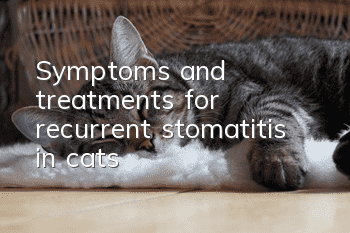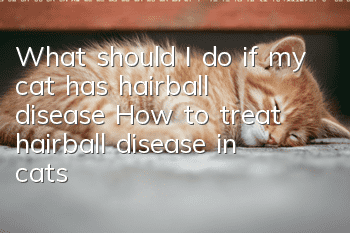Symptoms and treatments for recurrent stomatitis in cats

Recurrent stomatitis in cats is a disease caused by bacteria and viruses that cannot suppress the excessive immune inflammatory reaction of the oral tooth roots and surrounding mucosal tissues. Oral diseases affect cats’ eating and threaten their health. How should we treat this disease?
1. Symptoms
In the early stage, there was loss of appetite, bad breath, and sometimes crying when eating dry food; in the later stage, there was difficulty swallowing and oral pain. In the long term, the cat will scratch its mouth, shake its head, feel depressed, drool a lot, lose appetite, and lose weight. When examining the patient's oral cavity, it can be seen that the gums (especially the gums of the premolars and molars) and the surrounding oral mucosa are red, swollen and bleeding, and there are growths (flesh-like soft tissue). In some cases, the lesions spread to the throat.
2. Treatment methods
1. Conservative treatment
Use hormones to suppress inflammatory reactions, and use antibiotics to prevent and treat bacterial infections. It can have a better effect on cases with mild symptoms, reducing the cat’s pain and relieving symptoms. However, the effects of hormonal drugs do not last long. After a period of time, when the cat becomes unable to eat again, it needs to be used again. Repeated use will gradually reduce or even be ineffective, resulting in a shortened medication interval or the need to apply a larger dose. And hormone drugs often have serious side effects. Long-term and repeated use can have adverse effects on the cat's body, cause other diseases, and shorten the cat's lifespan.
2. Surgical treatment
Extraction of diseased teeth or all teeth is a commonly recommended measure. After tooth extraction, the cleanliness of the cat’s mouth will be improved. Without plaque or tooth stimulation, the condition will be easier to control and treat. Combined with daily oral cleaning, some cats can recover without the need for continued use of hormonal drugs and without recurrence. However, some cats will not recover or will still relapse after full tooth extraction. The reason is not yet certain. It may be related to diet, their own physical constitution, insufficient cleanliness in the mouth, etc. However, tooth extraction will at least make their condition easier to control and make their condition easier to control. Make medication more effective.
3. Post-operative care
Fasting is required for 3 days after surgery. You can drink water on the second day after surgery. You can eat soft food and liquid food for three days after surgery. If the mucosa recovers well, you can eat dry cat food after half a month. Adhere to the treatment with metronidazole infusion for 3 to 5 days. After stopping the infusion, you still need to inject subcutaneous antibiotics for several days to prevent bacterial infection. Regular review is required according to the doctor's recommendations to observe the healing of the tooth extraction site and the treatment effect. In the short term after tooth extraction, a small amount of white or light red saliva mixed with blood will still flow out of the cat's mouth. This is normal and will disappear naturally after a period of time. It is recommended to use oral care solution, which can effectively clean the oral mucosa and facilitate mucosal recovery. The recovery period of this disease is long. After 3 months to half a year, the original ulcer in the cat's mouth will completely disappear or most of it will disappear.
4. Diet after tooth extraction
Many people have questions, how will a cat eat after having so many teeth pulled out? Cats are carnivores and do not need molars to chew and grind food. Cats’ molars cannot complete the job of grinding food, so they mainly rely on swallowing. Pay attention to the cats around you. Although they will make a loud "squeaking" sound when eating cat food, they will not chew slowly like humans. They mainly chew the food habitually. So don’t worry about your cat not being able to eat dry cat food after a tooth extraction.
Pay attention to cats’ oral diseases and ensure their normal diet and health.
- Does a cat want its owner to accompany it before it dies?
- Cat vomited and stopped eating after changing cat food
- How to quickly make a cat trust its new owner
- Can cats suffer from asthma like people?
- What causes idiopathic cystitis in cats and how should it be treated?
- How to properly care for a Kratt cat?
- How long is a normal amount of sleep for a cat in a day?
- Three major benefits of grooming cats
- What should I do if my cat is panting heavily?
- Why do cats always like to chew on cardboard boxes?



